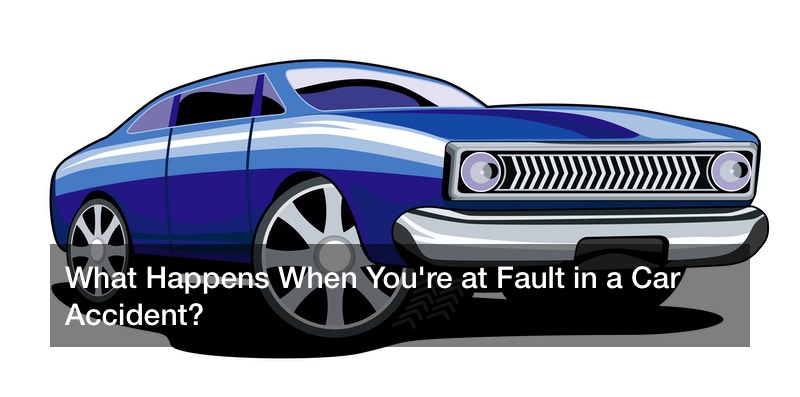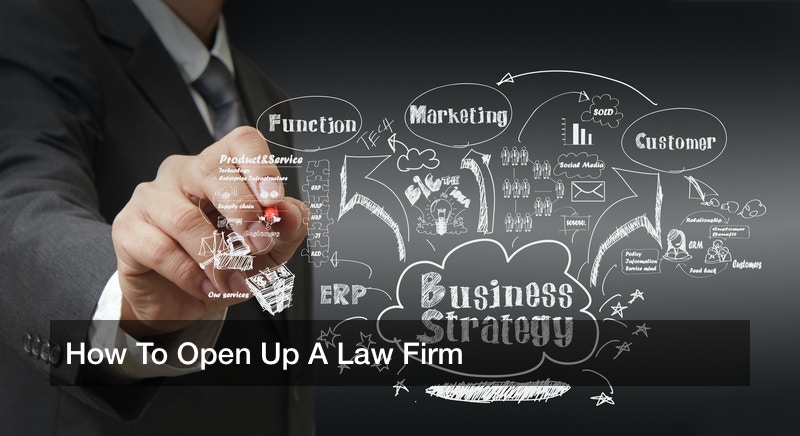
Statistics about car collisions and related injuries are harrowing.
Did you know that the average person is expected to experience three or more auto accidents in their lifetime? What’s worse is that common driving behaviors like speeding can greatly increase the chances of these accidents occurring.
Experiencing a car accident is terrifying enough on its own but being at fault in a car accident makes things a thousand times worse. Your mind begins racing.
What if someone is hurt?
Should I call the police?
What do I do?
There are many important things to remember after being at fault in a car accident. Today, we will go over the best procedure for handling the situation both on the scene and afterward.
On the Scene of The Accident

Imagine: The accident has just happened. Your vehicle has barely screeched to a halt and your first instinct is to exit the vehicle.
Don’t do it.
Adrenaline will likely have taken over your body and it can be difficult to think straight. Still, it is important that you stay still and assess the damage to you and your vehicle as well as gather your bearings.
Many car accident injuries come after the accident is complete. This is due to leaving the vehicle and stepping out into passing traffic. Keep in mind, your accident could cause another accident due to hazardous debris on the roadway. You don’t want to be standing in the road if that happens.
Once you’ve done a minor evaluation of your health and safety, it is time to call emergencies services and, if it is safe to do so, exit the vehicle to begin communicating with the others involved in the accident.
Take All the Pictures You Can
It is important to take pictures. Being at fault in a car accident does not mean that everybody else is completely innocent or that you have to be on the hook for damages that you did not create.
Take photos of your vehicle, the accident site, and any other cars that were involved.
These photos can help you down the line by creating a broad look at the accident that your insurance agency or personal injury attorney can refer to. Make sure your photos document the time of day and weather and road conditions.
If you don’t have a way to take photos, try writing down notes of relevant information. This information should also include the license plate numbers of any involved vehicles as well as their names and insurance information.
Be Honest, but Never Admit Fault
In the heat of the moment it can be natural to apologize and admit being at fault in a car accident. However, it is important that you keep those words to yourself. Whether speaking to the people involved in the accident, the police, or a claims adjuster, you want to be straightforward with the facts without explicitly admitting fault.
For instance, don’t say, “This is my fault, I was driving too fast and lost control of my vehicle.” Instead, only say, “I lost control of my vehicle.” This allows the police and insurance company to come to a conclusion on fault on their own.
Not admitting fault in an accident can be the difference between you paying higher insurance premiums and your family paying for traffic violation bail bonds.
Speaking with Your Insurance Agency

If you are uninjured and safe, you should ideally call your insurance company at the scene of the accident. The agent you speak to will be able to provide calm advice to help you remember to gather the right information from other drivers. They will also be able to immediately start processing your claim, which is a lengthy process.
Remember to follow these basic steps to make sure your accident is properly reported, and your insurance claim can be processed smoothly:
- Report your accident as quickly as you can
- Only provide the facts of the accident
- Take photos and submit them to your claims adjuster
- Ensure there is a police report filed on the accident
Does Insurance Cover Me if I Cause an Accident?
Insurance coverage varies based on the package you have purchased through your insurance agency. Some of the common types of insurance plans are collision, bodily injury liability, personal injury, and comprehensive.
So, how do each of these play into your coverage after being at fault in a car accident? Let’s take a look:
Collision Coverage
Collision coverage is a great way to make sure you are covered even after being at fault in a car accident. How much of the expenses are paid by you versus the insurance agency is dependent on the level of coverage you chose during purchase as well as your deductible.
Bodily Injury Liability
Liability insurance won’t cover your injuries or vehicle repairs, but if you are pegged as being at fault in a car accident, this type of coverage is important for the protection of your passengers. If any of them suffer an injury in the accident, your insurance will help cover their costs. The same applies for the driver and passengers of any other vehicles involve. Since this coverage also provides payments for pain or suffering, lost wages, funeral costs, and legal fees, you can feel safer from any surprise lawsuits.
Personal Injury
The name might give it away on this one, but personal injury insurance helps cover the costs of your medical bills when you are injured in an accident. Even if you are the cause of the accident or if there are no other vehicles involved. This level of coverage is important because auto repair may sound like the most expensive part of a car accident, but hospital bills can trump those numbers by thousands of dollars.
Comprehensive Insurance
If you are in an accident that doesn’t involved any other vehicles (you hit a tree or a deer or hydroplane into a ditch), comprehensive insurance is the coverage you need. The biggest benefit of comprehensive coverage is its ability to help if your car is stolen. Comprehensive coverage is typically required for those who are leasing a new car as it helps cover the cost of totaled vehicle.
What if Insurance Won’t Replace or Repair My Car?
Whether you have a new or used car, insurance coverage can sometimes fall short on the cost of repairs and replacement. If you are financing a car, your insurance payout will go directly to your lender and you may end up with no vehicle and a bill for what you still owe the lender.
Gap insurance can help cover this difference in these numbers to save your pocketbook.
If your vehicle is totaled and your insurance has left you with no way to purchase another, you may want to inquire about claiming the totaled vehicle. This way you can sell the car to try and earn enough for a down payment on a new vehicle, or you can attempt to repair the vehicle yourself.
Just remember that you can’t legally tag and title a totaled vehicle until the repairs are made.
Who Proves Fault in an Accident?

Being at fault in a car accident is determined through the collaborative efforts of insurance agencies and the police. In most states, traffic collisions are investigated through a fault-based lens. This means that somebody has to be found at fault in a car accident during the insurance investigation.
To find who is at fault, a claims adjuster will first look at the police report as well as evidence from the scene of the accident.
If you have witnesses to the accident, be sure to provide their information to your claim’s adjuster. They may be able to provide insight on details you hadn’t considered, which can adjust the level of culpability that falls on you.
Possible Penalties after Being Found at Fault
After being at fault for a car accident, you will likely be issued a citation or even land criminal charges.
Common Citations
You may be given a citation if police find evidence of speeding or other broken traffic laws. Additionally, rear-end accidents almost always result in a ticket for driving too close to another vehicle.
Other accidents are considered to only be possible if a traffic law is broken (like head-on collisions on a one-way road) and will always result in a citation or worse.
Civil Court Action
After being at fault in a car accident, any victims from the other vehicles may choose to file a civil lawsuit against you. If you were carrying proper insurance, chances are their claim has been resolved and nothing will come of a court hearing.
However, if you were driving with no insurance, or your insurance failed to properly cover the extent of the victim’s damages, a judge may find you responsible for a cash payout to the victim.
Criminal Charges
Technically, breaking any traffic law is a criminal offense. However, these things are typically handled through citations that can be paid without the need for a court appearance. Still, there are some offenses that will result in serious, criminal charges.
- DUI
- Vehicular Homicide
- Gross Negligence
- Child Endangerment
What if I am Facing Criminal Charges?

If you are facing criminal charges for being at fault in a car accident, you need to find proper legal representation. Some lawyers specialize in handling car accident perpetrators and can help you navigate to the best solution for you.
If you are being charged for driving under the influence, your best bet is to find DUI lawyer. They will have all the niche knowledge necessary to try and keep you from seeing time in jail.
Another important goal for those receiving criminal charges is to research bail bonding services in your area.
How to Find Bail Bonding Services
When bond is set for an arrested individual it may be set as a cash bond. This means that you won’t be allowed to finance any of the bond amount through a bail bond agency. This money can still be received through a personal or family loan, but the full bond amount must be given to the court for the duration of your criminal case.
If you aren’t dealing with a cash-only bond, you can look into bail bonds from the services of a bail bond agency. These bondsmen create a leasing agreement where you or a loved one can make payments over time to the company in exchange for them pledging the bond amount to the court on your behalf.
Some cities have a plethora of these bondsmen, but if you are having trouble locating a good option, you may have more success with online bail bonds. With these services, it doesn’t matter where the court is located – your loved ones can quickly handle the coverage of your bail.
The Aftermath: Handling your Mental Health
Car accidents may be common, but they are very mentally taxing. When you consider the effects of dealing with the guilt from being at fault in a car accident, the overall toll may seem insurmountable.
Some of the symptoms you may feel after your accident include:
- Anger
- Denial
- Anxiety
- Guilt
- Shock
- Fear
Studies have shown that car accidents can cause post-traumatic stress disorder for both victims and those at fault. Unfortunately, those who suffer from this disorder can deal with lifelong symptoms if they don’t seek help.
Finding Help
After your accident, reach out to friends and family for a listening ear. If you find that you need more, try speaking with a trained counselor. Being at fault in an accident doesn’t mean you don’t deserve to have your mental health protected.
Many people suffering from the stress of a car accident speak on finding relief through keeping active and working hard to get back to their daily routines. In this way, they can reclaim a sense of normalcy.
Preventing Additional Accidents
Being at fault in a car accident is one of the most stressful experiences you can have. Unfortunately, those who don’t take efforts to change their habits are more likely to have additional accidents.
The most important change you can make to your driving behaviors is to be defensive. Defensive driving can lower the likelihood of any additional accidents through the avoidance of distractions and the awareness of your surroundings.
Sign up for a defensive driving course through your local DMV or search for classes online. Taking the course can also lower your insurance premium, which can help offset the premium increase caused by the initial accident.



